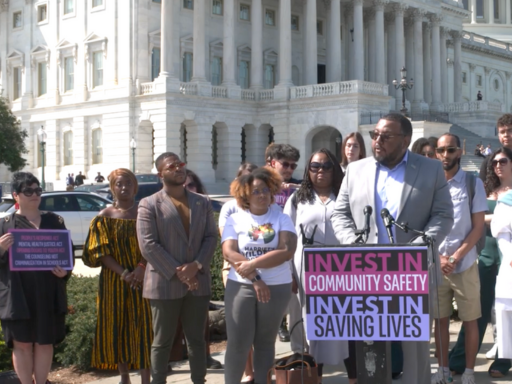
Leading from the back isn’t easy…especially when the voices upfront are powerful, dynamic, and fearless.
Such was indeed the case in April when Will Simpson, EJUSA’s director of community safety and justice, had to ride behind the vortex of passionate progressive leadership that is Congresswoman Cori Bush, a brave survivor of homelessness who transcended her harsh hard times to emerge from the blood and pain of the Ferguson Uprising to the reach and interrupt the halls of the Congress; that is Congresswoman Ayanna Pressley of Boston who has been courageously and unapologetically putting the brakes of mass incarceration, now coming for Black and Brown women and girls in its sinister onslaught; and Congresswoman Katie Porter, a bold progressive repping Orange County, California, most often a bastion of privilege, conservatism, and wealth—she speaks truth to power for community in the DC battleground.
Not to mention strong community voices like Rukia Lumumba of the Movement for Black Lives, who has the painful distinction of having to organize and advocate in the starkly re-segregated, and at times quite dangerous, Jackson, Mississippi.
The April press conference was a powerful gathering that proudly brought forward the national Community Safety Agenda and its over 70 plus organizations who make up the Community Safety Working Group. This is a growing movement of community forces championing and employing what community-led approaches to violence prevention and intervention look like without the police!
The entire advocacy team spent hours before and after the press conference engaging elected officials to move this agenda forward. They held around 15-20 meetings with congressional representatives, including those from Louisiana, New Jersey, and Missouri, emphasizing the importance of these reforms and building support.
The agenda is sheltered and anchored by the paradigm-shifting Peoples Response Act (PRA), put forth by Rep. Bush. This proposed legislation places this community safety work in the federal government’s Department of Health and Human Services, under a proposed Division on Community Safety, where it belongs. The PRA provides the kind of allocation of resources to help this work reach sustainable space.
The agenda is muscled and built out by Rep. Porter’s Mental Health Justice Act, which aids state and local governments developing response programs that don’t rely on police to address people facing mental health crises, instead of the police. We see these groundbreaking programs in Denver, St. Louis, and Eugene, Oregon.
And Rep. Pressley’s Counseling Not Criminalization in Schools Act, which minimizes the police presence in schools, interrupts the school-to-prison pipeline, and instead invests in much-needed counseling supports instead. Finally, there is the Opening Doors To Youth Act, which expands employment and educational programs and resources for at-risk youth.
Congress also has the opportunity to pass the Break the Cycle of Violence Act, which directs vital funds to communities impacted by violence to help them implement evidence-based programs that stop violence, heal trauma, and prevent harm.
Will spoke near the end of the press conference and leaned into the Afro-Indigenous principles of the organization, and acknowledged the underappreciated human dimension driving all of this work, the leadership of primarily Black and Brown women, just as we saw in the George Floyd Summer, a season of protests powered by the relentless energy of these women.
Will then brought the story of Najee Seabrooks. The tragedy that ended his life exemplifies why this work is so critical and why we must continue to push forward, despite the obstacles. Najee was a young vibrant healer and violence interventionist with the Paterson Healing Collective. Paterson police officers killed him when he was experiencing a mental health crisis, even though he called his team to help him. His team came, but police blocked them from doing what they do. A different kind of crisis response, like Rep. Porter’s Mental Health Justice Act, could have prevented Najee’s death.
Since losing Najee, the New Jersey Violence Intervention and Prevention (NJVIP) coalition won a serious cat fight to get a bill through the often clueless and disconnected New Jersey State Legislature. The new measure pilots community-led emergency response teams in six New Jersey counties. The Seabrooks-Washington Bill, named after Najee and Andrew Washington, who was killed by police in Jersey City recently, was signed into law by Governor Murphy.
It will be another battle to see to it that it is properly implemented with the resources and care to details it needs to succeed.
Why has that been so difficult?
Because the bill wound up in the administrative law enforcement arms of the State Attorney General, when it really should live in the State’s Department of Health. Unfortunately, our Department of Health wasn’t ready to receive the tasks of the bill. Perhaps, with more education, they will in the near future.
The Community Safety Agenda, and in particular its anchor, the People’s Response Act, which facilitates a natural and much needed paradigm shift, properly placing this work in public health space, would give this lifesaving work the legs of sustainability it so needs and deserves
Let’s thank all of the 70+ orgs in the Community Safety Working Group that did this work, along with Reps. Bush, Porter, and Pressley.
Now how about a Reimagined Freedom Summer for Peace in our Streets!
Advance the Community Safety Agenda now!



